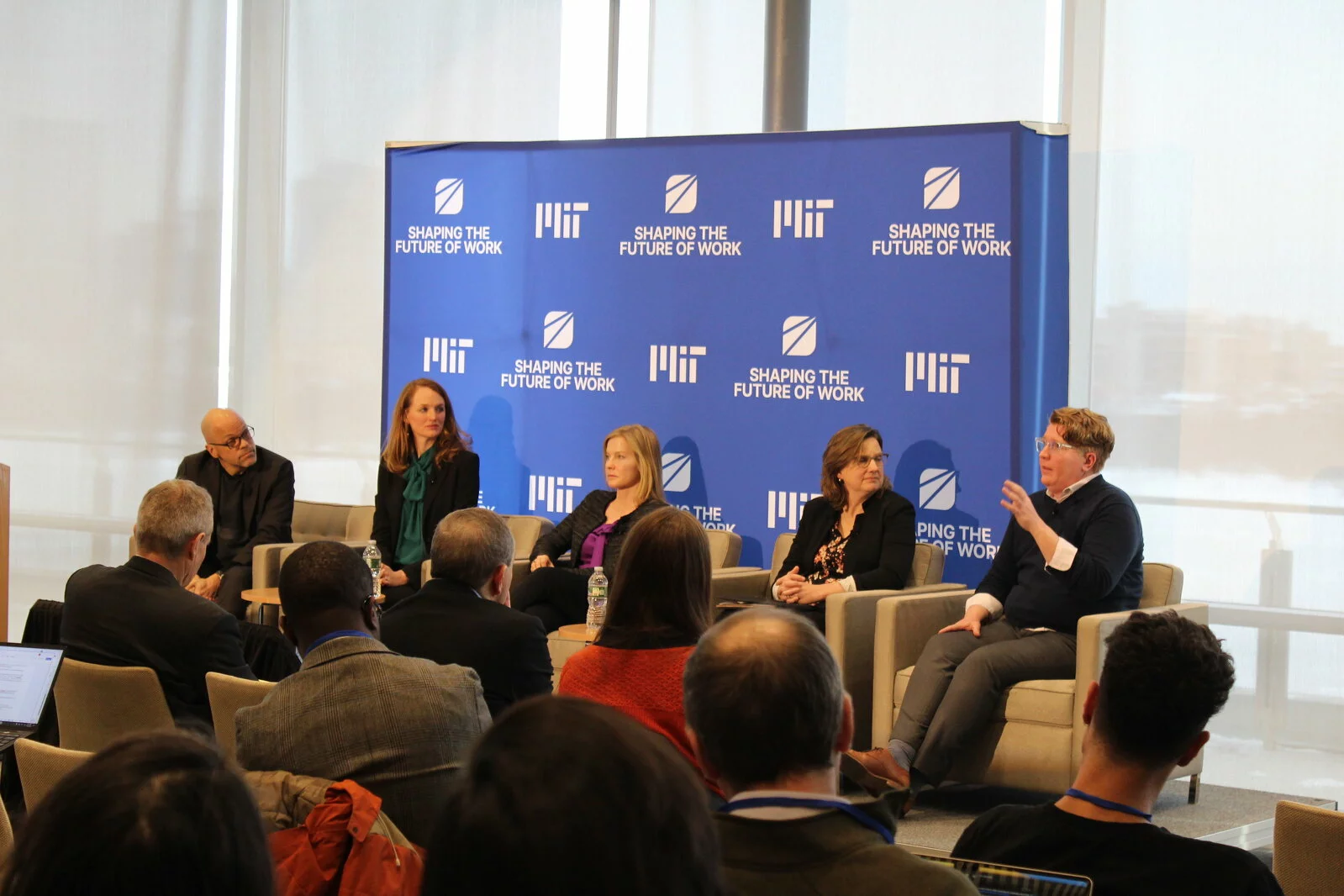On January 21, 2025, the MIT Shaping the Future of Work Initiative convened scholars, policymakers, and practitioners at MIT to explore how to align innovation and equity in the digital economy. Through a series of engaging panels, speakers discussed how new technologies, particularly AI, are reshaping, industrial relations, market competition, and the nature of work, presenting both challenges and opportunities for workers.
The symposium opened with remarks from Initiative co-director Daron Acemoglu, who emphasized that the path of AI development is neither inevitable nor inexorable. Like previous waves of digital automation, AI could exacerbate inequality – but if shaped deliberately, it could instead create opportunities and new tasks that benefit workers and reduce inequality.
The first panel, chaired by Xavier de Souza Briggs (Brookings), focused on labor relations and worker representation in an age of rapid technological change. Amanda Ballantyne (AFL-CIO Technology Institute), emphasized the importance of unions engaging proactively with emerging technologies, and the benefits of involving workers in the R&D process. Erin Kelly (MIT Sloan) discussed the role of organizational policies in balancing innovation with job quality and worker autonomy. Molly Kinder (Brookings) offered insights from her research on the current state of AI adoption across sectors, and emphasized the need for experimentation and new models of how to bring workers to the table. Frida Polli (MIT) drew on her experience as a technologist and entrepreneur to discuss the challenges and opportunities of algorithmic transparency and the importance of local and state regulatory action, emphasizing that regulation is not anti-innovation. The panel underscored the importance of collective bargaining, policy interventions, and corporate accountability in ensuring that new technology benefits workers.
The second panel, chaired by Initiative co-director David Autor, discussed the latest research on AI and opportunity in the labor market. Sendhil Mullainathan (MIT) outlined the competing visions for computing technology and how current benchmarks drive technological development toward automation, rather than human complementarity. John Horton (MIT Sloan) analyzed several studies of AI deployment in labor market matching, concluding that for AI to be an asset, it must convey useful, accurate information to employers and job candidates. Lindsey Raymond (Microsoft Research, Harvard) discussed her research on AI in call centers and its implications for the global workforce, including which workers benefit from AI-driven productivity gains. The panelists discussed the implications of their research for shaping the direction of AI, concluding that a reorientation of incentives for the design and development of technology is crucial to ensure AI augments, rather than replaces, human labor.
Led by David Thesmar (MIT Sloan), the third panel discussion focused on how technology is reshaping financial markets and competition. Thomas Philippon (NYU Stern) discussed how digital technologies can expand access to financial services, and the extent to which monopolization of the asset management sector impacts consumers. Antoinette Schoar (MIT Sloan) discussed how data availability and algorithmic decision-making in financial markets is transforming capital allocation, particularly to small businesses and startups, and emphasized the need for regulation to ensure market competition. Randy Kroszner (University of Chicago) examined the impact of fintech and AI-driven financial services on financial inclusion and liquidity, and assessed the current state of competition in the financial sector. The panelists debated whether technology is democratizing finance and introducing more competition or reinforcing existing power structures, and how regulators can respond.
The symposium concluded with remarks from Initiative co-director Simon Johnson, who highlighted the Initiative’s work over the past year and emphasized the importance of cross-sector, cross-disciplinary collaboration to tackle questions of technology, inequality, and the future of work.
The afternoon’s discussions reinforced the need for policies and incentives that align innovation and equity, ensuring that transformative technologies such as AI drive toward shared prosperity, rather than entrenching inequality.
Agenda
January 21, 2025
MIT Samberg Conference Center
Speaker
Panelists
Amanda Ballantyne
Executive Director, AFL-CIO Technology Institute
Erin L. Kelly
Sloan Distinguished Professor of Work & Organizations, Co-Director of MIT Institute for Work and Employment Research (IWER), MIT
Molly Kinder
Fellow, Brookings Institution
Frida Polli
Visiting Innovation Scholar, MIT
Chair
Xavier de Souza Briggs
Senior Fellow, Brookings Institution
Panelists
John Horton
Associate Professor, MIT Sloan
Sendhil Mullainathan
Peter de Florez Professor, MIT
Lindsey Raymond
Postdoctoral Researcher, Economics and Computation at Microsoft Research & Harvard University
Chair
David Autor
Daniel (1972) and Gail Rubinfeld Professor, MIT Department of Economics, Shaping the Future of Work Initiative Co-Director
Randy Kroszner
Norman R. Bobins Professor of Economics, Booth School of Business, University of Chicago
Thomas Philippon
Max L. Heine Professor of Finance, NYU Stern
Antoinette Schoar
Stewart C. Myers-Horn Family Professor of Finance, MIT Sloan
Chair
David Thesmar
Franco Modigliani Professor of Financial Economics, MIT Sloan


